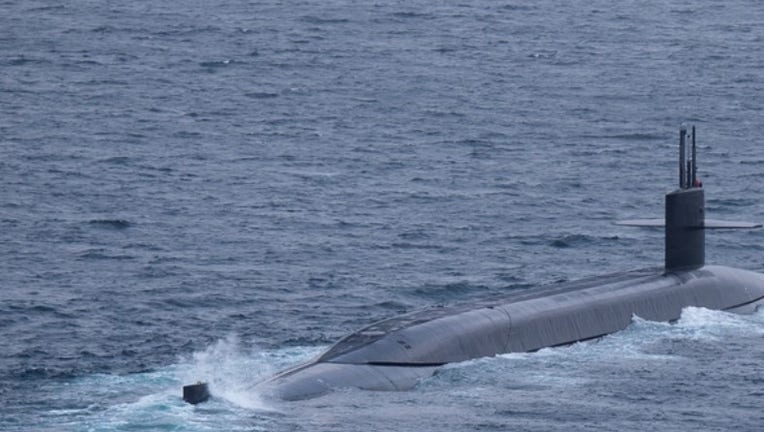US sends nuclear-armed submarine to S. Korea in show of force against N. Korea

USS Kentucky (Credit: DVIDS)
SEOUL, South Korea (AP) - The United States deployed a nuclear-armed submarine to South Korea on Tuesday for the first time in four decades, as the allies warned North Korea that any use of the North's nuclear weapons in combat would result in the end of its regime.
Periodic visits by U.S. nuclear ballistic missile-capable submarines to South Korea were one of several agreements reached by the two countries' presidents in April in response to North Korea's expanding nuclear threat. They also agreed to establish a bilateral Nuclear Consultative Group and expand military exercises.
The USS Kentucky, an Ohio-class submarine, arrived at the South Korean port of Busan on Tuesday afternoon, South Korea's Defense Ministry said. It is the first visit by a U.S. nuclear-armed submarine to South Korea since the 1980s, it said.
RELATED: American soldier detained after crossing into North Korea without authorization
Defense Minister Lee Jong-Sup called the submarine's visit a demonstration of U.S. resolve in implementing its "extended deterrence" commitment, a pledge by the U.S. to use its full military capabilities, including nuclear weapons, to protect its allies, the ministry said in a statement.
He said the submarine's visit "shows the allies’ overwhelming capability and posture against North Korea."
During the Cold War in the late 1970s, U.S. nuclear-armed ballistic missile submarines made frequent visits to South Korea, sometimes two or three times per month, according to the Federation of American Scientists. It was a period when the U.S. had hundreds of nuclear warheads located in South Korea. But in 1991, the United States withdrew all of its nuclear weapons from the Korean Peninsula.
North Korea’s nuclear ambitions have taken on a new urgency after it threatened to use nuclear weapons in conflicts with its rivals and conducted about 100 missile tests since the start of last year. Last week, North Korea conducted a second test of a more mobile and powerful intercontinental ballistic missile designed to strike the mainland United States. After observing that launch, North Korean leader Kim Jong Un vowed to further strengthen his country’s nuclear combat capabilities.
RELATED: Kenya doomsday cult deaths top 400, pastor and dozens of others in custody
Also on Tuesday, South Korean and U.S. officials held the inaugural meeting of the Nuclear Consultative Group in Seoul to discuss ways to strengthen deterrence against North Korea's nuclear threats.
White House: North Korea providing Russia with artillery shells amid war
The White House said Wednesday that North Korea is covertly sending a significant number of artillery shells to Russia amid the war with Ukraine. Political science professor, Mikhail Alexseev talks with LiveNOW from FOX's Josh Breslow to provide the latest information.
"Any nuclear attack by North Korea against the United States or its allies is unacceptable and will result in the end of that regime," the two countries said in a joint statement after the meeting.
President Joe Biden issued a similar warning after his summit in Washington with South Korean President Yoon Suk Yeol in April.
"Both sides affirmed that the NCG will play an integral role in discussing and advancing bilateral approaches, including guidelines, to nuclear and strategic planning and responses to (North Korean) aggression," the statement said.
The consultative body is tasked with sharing information on nuclear and strategic weapons operation plans and joint operations. The U.S. will retain operational control of its nuclear weapons. U.S. officials say the group’s establishment and other steps announced in April were meant to ease South Korean worries about North Korean provocations while keeping Seoul from pursuing its own nuclear program.
Earlier Tuesday, Yoon told a Cabinet meeting that the launching of the consultative group "will serve as an important starting point to establish a powerful, effective (South) Korea-U.S. extended deterrence," and that their alliance has been "upgraded with a new, nuclear-based paradigm."
The meeting was co-chaired by U.S. National Security Coordinator for Indo-Pacific Affairs Kurt Campbell and South Korean Deputy National Security Director Kim Tae-hyo.
North Korea condemned the Biden-Yoon agreements in April, saying they proved the allies’ extreme hostility toward the North. It threatened to further escalate its nuclear use doctrine in protest.
In a statement Monday, Kim's powerful sister and senior adviser, Kim Yo Jong, warned that U.S. moves to reinforce its extended deterrence commitment to South Korea will make North Korea "go farther away from the negotiating table desired by (the U.S.)" and beef up its own military capability.
"(North Korea) is ready for resolutely countering any acts of violating its sovereignty and territorial integrity," Kim Yo Jong said. "The U.S. should stop its foolish act of provoking (North Korea) even by imperiling its security."

